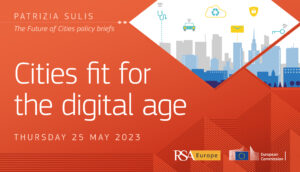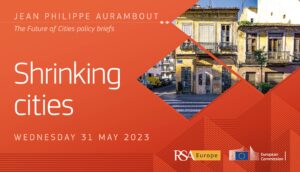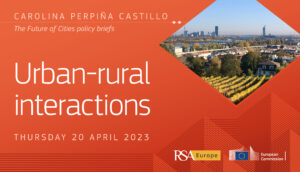JRC Webinar Series
The Future of Cities Webinar Series
Date and time
Summary
The Future of Cities report identifies challenges influencing the future of cities in Europe and beyond. It also presents several perspectives from which to look at resolving these issues. It is an initiative of the Joint Research Centre (JRC), the science and knowledge service of the European Commission (EC), supported by the Commission's Directorate-General for Regional and Urban Policy (DG REGIO).
By taking stock of current knowledge and understanding of city systems, the report highlights potential pitfalls cities should avoid, and defines broad principles they should lean towards. It aims to foster discussion and help policy makers, individual cities and their citizens choose the best way forward.
The main urban challenges identified in the report concern: affordable housing, mobility, the provision of services, social segregation, ageing, climate action, the environmental footprint, and urban health. At the same time, it is illustrates that cities are uniquely equipped to tackle such challenges – the abundance of available physical space, a large and diverse population, a certain level of autonomy, and openness to technological advancements and innovation, to name but a few, may offer ways to relieve the pressures cities face.
With the completion of the stand-alone report, the work continues in the form of the publication of policy briefs, short documents that focus on a single urban issue, bringing together empirical knowledge and policy implications. Recent policy briefs focus on the topics of: urban-rural interactions, cities fit for the digital age, and shrinking cities. More policy briefs are expected to follow in the future.
In this respect, the Future of Cities report and policy briefs benefit greatly from the collective intelligence put forward by the Members of the EC Community of Practice for Cities (CoP-CITIES). The CoP –CITIES brings together cities, city networks, academia and NGOs to share knowledge and expertise on urban issues, to anticipate potential challenges, and to generate scientific evidence for effective urban policies.
The future of cities is not set in stone and is not easy to predict, but the choices they make now will shape the lives of generations to come. Thus, the main aim is to raise open questions and steer discussions on what the future of cities can, and should be, both within the scientific and policymaker communities. The Future of Cities also has a dedicated platform.
RSA Europe is pleased to be working with the EU Commission’s Joint Research Centre (JRC) to deliver a webinar series on the Future of Cities. The series will feature three webinars:
Webinar Details & Links to Recordings
Presentations from session: Carolina Perpiña Castillo, Daniel Arribas-Bel
Urban-rural interactions and their territorial disparities, Thursday 20 April 2023, 13.00-14.00 BST/ 14.00-15.00 CEST
Speaker: Carolina Perpiña Castillo, Joint Research Centre, European Commission
Abstract: Urban areas are usually considered the main centres of economic activity with a high population concentration, good infrastructure, service provision offering employment, social services, innovation and recreational opportunities that attract people to live there . However, cities are also heavily dependent on peri-urban and rural areas, especially for food production and basic products, management of natural resources, protection of natural landscape, as well as recreation and tourism. Mutual inter-dependencies exist over the continuum between urban, peri-urban and rural areas, conceptually described as ‘linkages’ or ‘flows’. These can be associated to people, goods and public services or environmental flows.
Under the lens of the degree of urbanisation, this policy brief analyses territorial discrepancies and flows between types of settlements across several dimensions such accessibility of essential services and internet connection, housing market, tourism capacity, as well as natural resources and population dynamics. Incorporating this territorial perspective, strategic development policies have gained momentum with a tendency of creating large and strong functional regions with a focus on the enhancement and the intensification of urban-rural interactions that can help to reduce inequalities, ensure the well-being of citizens and the development of balanced and sustainable territories. Policy Brief
Speaker: Daniel Arribas-Bel, University of Liverpool, UK
Abstract: Developing Detailed, Consistent and Scalable Characterisations of Urban Form & Function
This talk will introduce the Urban Grammar, a project using data science and machine learning to build a detailed, consistent, and scalable characterization of urban form and function in Britain. Form and function are relevant for many areas in regional studies such as the delineation of the urban and the rural. Despite its relevance, the measurement of urban form and function has been hampered by the availability of meaningful spatial units, good data, and meaningful metrics. We will introduce a new data product -the spatial signatures- that leverages state-of-the-art data science to facilitate access to granular descriptions of urban form and function in Britain.
Chair: Heike Mayer, University of Bern, Switzerland

Presentations from session: Patrizia Sulis Eman Zied
2nd Webinar: Cities fit for the digital age, Thursday 25 May 2023, 13. 30-14.30 BST/ 14.30-15.30 CEST
Speaker: Patrizia Sulis, Scientific Officer - Spatial Data Science, Urban Analytics, Machine Learning, Joint Research Centre, European Commission
Abstract: Digital technologies and innovative solutions can act as critical enablers in enhancing services and contribute to improving the urban environment and the overall quality of life of its citizens. Cities and communities should implement interoperable solutions, based on existing open standards and technical specifications, to avoid vendor-lock in, benefit from cross-domain, integrated services and infrastructures, reduce costs, and scale up successful projects. Efforts should be made to increase resources and improve capacity and skills around data management as well as in the use of innovation procurement. The introduction of new services and technology applications can create or increase disparities in terms of the digital and social divide in relation to age, gender, economic status, etc. Public bodies at local, national and EU level need to introduce appropriate measures to prepare for the possible consequences of digital innovation in cities. Policy Brief
Speaker: Eman Zied, Research Associate, Population Health Sciences Institute (PHSI), Newcastle University, UK
Abstract: Decisions and Deserts: Tools to Help Cities Be Smart and Equitable
Equity in urban infrastructure provision is an evergreen research topic as well as an ongoing challenge to those charged with service provision. An essential component of cities in the digital age are sensors, networks, and computational apparatuses, which are essentially novel iterations of more traditional infrastructures and embody many of the same distributional challenges. In this research we develop a Spatial Decision Support System or Tool (SDSS or SDST) to support decision-makers in equitable sensor distribution. Our tool’s main purpose is to suggest candidate networks that can fulfil multiple sensor coverage objectives and accept user input in selecting the optimal network for their purpose. The tool is a proof of concept for how to think about sensor network purpose and distribution before actual placement. The unique combination of algorithms, user interface, and decision-maker input offer a novel approach to sensor network conceptualisation and generation. This study contributes to the knowledge around distribution of essential infrastructures and can be repurposed for any sensor type and location.
Chair: Ed Manley, Professor of Urban Analytics, School of Geography, University of Leeds, UK

Presentations from session: Jean-Philippe Aurambout Rene Fleschurz
3rd Webinar: Shrinking Cities, Wednesday 31 May 2023, 13.30-14.30 BST/ 14.30-15.30 CEST
Speaker: Jean-Philippe Aurambout, Joint Research Centre, European Commission
Abstract: Over the course of history, cities, influenced by various historical, social, economic, demographic or political factors, have gone through cycles of growth and decline. While the world population has been increasing and is continuing to concentrate in cities, the idea that all cities are continuously growing is false. As population ages and fertility rates fall or as the result of outmigration, an increasing number of cities are shrinking, particularly in the USA, Europe and Japan but also in the developing world. In fact, shrinking may well become the new normal for many cities and the populations that inhabit them. Shrinking is a complex process that affects multiple aspects from the physical structure of the city to its social and demographic fabric. Policy Brief
Speaker: René Fleschurz, Department International Planning Systems, TU Kaiserslautern, Germany
Chair: Beatriz Fernandez, Associate Professor, Urban Geography, EHESS – École des hautes études en sciences sociales, France
To view the recordings from the Future of Cities 2024 series, please click here.

